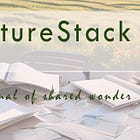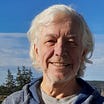Nature writer, n. A person who delights in paying attention, being astonished, and telling about it.1
“Nature is resilient while we are fragile; nature is abundant while we create scarcity; nature is relational while we are transactional; nature thrives without money or politics; nature will outlive us. These are all lessons that we need to learn.” ~ John Lovie
My inbox is full of treasure in the form of lovingly observed writing about place, encounters both wild and gentle, imaginative kinship and renewed reciprocity. These thoughtful, talented writers kindled in me the desire to learn more about them.
Today’s guest,
is an islander, water lover, writer, and a recovering award-winning serial non-profit volunteer. Born in England, he's also lived in Holland and on both coasts of the United States. I first encountered John through posts like "Be Famous for 15 Miles,"2 in which he asks, “Do you think it could be a general rule that the only place one is urgently needed is at home?” John opens by crediting both Gary Snyder and Wendell Berry with that question, as quoted in a recent post by another marvelous writer here, . I was hooked!John’s newsletter, Mostly Water is, like the human body and the earth's surface, mostly, but not entirely, water. Whether the topic is the effect of climate change on sea level rise, storms and flooding; “Forever Chemicals” in our groundwater and drinking water; land use; animal agriculture; community; travel; memoir; or just the view from the window, water runs through most of Mostly Water.
Why are you drawn to nature writing?
I'm drawn to nature writing because nature brings me peace, and because nature is the teacher we need at this time.
Dominionism, the idea that we are masters of nature, rather than part of her, is at the root of so many of our problems and crises today. Living now on an island in the Pacific Northwest, I'm surrounded by nature. Here it's easier to feel the connection and to experience more directly the damage we're doing to the environment, because we can see that damage come back to bite us, whether it's coastal flooding from sea level rise, shellfish die-offs from marine heatwaves, struggling salmon and orcas, or wildfires and their smoke, and I feel a duty to share that.
If we can stop inflicting the harm, then nature can recover. Nature is resilient while we are fragile; nature is abundant while we create scarcity; nature is relational while we are transactional; nature thrives without money or politics; nature will outlive us. These are all lessons that we need to learn. Nature was here billions of years before us and she will be here billions of years after us, a manifestation of the infinite and timeless.
How does writing about nature affect you, in your work or personal life?
I try to keep all these aspects of my life in alignment with my values and with nature, and writing about nature has helped me do that. My writing ranges from reporting on serious environmental topics such as PFAS contamination in drinking water to personal stories, all infused with nature. The more I write, the more I find my writing mirrors my life!
Writing has given me a way to communicate with and influence people after leaving boards and committees behind and to be a strong, independent voice for nature. It's also given me a window into my own life through which I've been able to write some more personal pieces. Those things in turn have given me the freedom and the confidence to stop switching between work mode and personal mode and show up as the same nature-loving self in all parts of my life.
While outside, have you ever experienced feeling small, lost or in danger?
I do feel small sometimes, especially here in the Pacific Northwest where I'm surrounded by Puget Sound, the mountains and volcanoes of the North Cascades and Olympic Peninsula, and our few remaining old-growth forests.
I don't believe I've ever felt lost in nature. I try very hard not to let that happen! Besides, how can you be lost when you're home?
I've felt in danger at sea. When I was about fifteen, I was sailing with a friend when we capsized in the middle of the Solent several miles from land. I was convinced we were going to die. As you can tell, we didn't! We managed to right the boat and make it back.
What’s a favorite memory of nature from your childhood?
My early childhood years were spent on a housing estate in England. Contact with nature was mostly indirect. At school there were occasional teacher-led nature walks around the grounds, and trophy animal heads from around the former British Empire on the walls of the room where we had morning assembly. For much of the year, nature was something I saw on black and white TV; a young David Attenborough chasing armadillos in Paraguay; Hans and Lotte Hass (forerunners of Jacques Cousteau) swimming with whale sharks and manta rays. In the summer, we'd head to the beach where I'd put on a mask and snorkel and explore underwater. I felt an immediate sense of peace and freedom, something I still feel today as soon as my head dips beneath the waves.
When I was eleven, we moved to a house which had an area of common land across the street, a recovering former sheep pasture, which became the favorite hangout for my friends and I. I reveled in that open space, the long grass and the gorse. We could also bicycle into the countryside. Those teen years brought some of my most memorable early experiences in nature such as hiking in the Peak District, sailing in the Solent, and kayaking in Kimmeridge Bay among the fossils of Dorset's Jurassic coast, but the most profound was a boat trip to the Clyde estuary in Scotland.
What do you hope for, for your writing?
I write through the lens of water. Water is, of course, life. Neither we nor nature can survive without it, and clean, abundant water can't survive without nature. The lens of water makes it clear that our relationship with nature is reciprocal, that we are part of nature and completely reliant upon her, and damage we inflict on her is ultimately damage we inflict on ourselves. I hope my writing can show that to my readers.
A writer or other creative artist who makes you hopeful for humanity and the earth.
There are so many! The aforementioned David Attenborough for his love and enthusiasm for nature, and his ability to inspire others to feel the same way; economists such as E.F Schumacher and Elinor Ostrom for showing alternatives to the capitalism that's imperiling the planet and all its inhabitants; and of course all the wonderful nature writers on Substack who have graced this column and beyond.
If you enjoyed this post, a lovely ❤️ keeps me going. Another way to show love is to share this post with others by restacking it on Notes, via the Substack app. Thanks!
Notes and links
I’m scheduling the next round of interviews to begin in January. If you’d like to participate, please DM me on chat, or reach out via email: gabrielli-dot-julie-at-gmail. Find previous interviews here.
For more inspired nature writing and artwork from the best of Substack, check out the articles in NatureStack journal.
In further service to Substack’s nature writers,
curates this lovely directory of nature-focused writers:thanks, Mary Oliver









